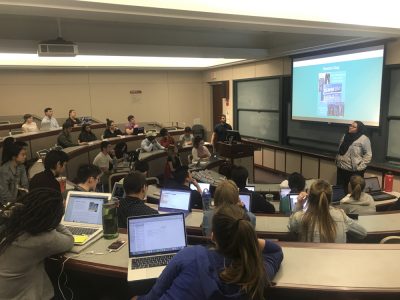
Boston University’s Student Government met Monday night to hear updates from the 16,000 Strong Committee and vote on an amendment to next year’s constitution.
Lul Mohamud, the co-chair of the 16,000 Strong Committee, which is dedicated to promoting sexual assault awareness, presented an update on the committee’s activities in April for Sexual Assault Awareness Month.
The committee faced difficulties in its organization this semester, Mohamud said. With only five members, the committee struggled to run events. Ultimately, the committee managed to put on three events.
“… We did have some complications and obstacles going across [them], including timing and budgeting,” Mohamud said, “However, we worked with it and we still believe the impact was important and successful.”
Going forward, Mohamud said, the group will aim to improve its outreach and involve more of the student body in its Sexual Assault Awareness Month activities.
“What we’ve noticed over the last couple of years [is that] everyone does support what we do morally,” Mohamud said. “However, that support is not being translated over [to] people on the ground.”
Maya Malekian, a freshman senator in the College of Communication, said 16,000 Strong has made sexual assault awareness tangible for students.
“A lot of times sexual assault can be this complex topic no one really wants to tackle but feel morally obligated to respect,” Malekian said. “I think what 16,000 Strong has done is made it so that students can see it, understand it and act upon it.”
Members of the Executive Advisory Commission attended the meeting to give an update on the work they have done over the course of the semester. Commissioner Alicia Espinosa said the commission has worked to digitize SG records dating back to the 1990s.
Andrew Chiao, a sophomore senator in the College of Arts and Sciences, Nehemiah Dureus, a junior senator in the College of Engineering and Aditya Jain, a freshman senator in ENG, led a vote on their proposed amendment to the SG constituion: the Caucus to Authorize Provisions Amendment. The amendment would require Cabinet to pass many financial decisions through Senate, including all Cabinet spending over $2,000 or 5 percent of SG’s budget.
Senators voted to revise the amendment to require a $2,000 threshold for a single event. For Cabinet to spend more than this amount, they must receive approval from Senate. The revised amendment passed with 27 approving and one abstaining.
Senate Chair Octavio Vidal, a senior in the Sargent College of Health and Rehabilitation Sciences, said he thinks the new $2,000 spending threshold for single events was a good compromise.
“I see the [senators] want to be included in all the decision-making processes,” Vidal said. “But for everybody to be included in every single decision makes things go a lot slower.”
Michael Meagher, a sophomore senator in CAS, said he was concerned that the amendment would inhibit e-board to the point of not being able to achieve its goals. Meagher supported the amendment after the proposed revision.
“I am not happy with the amount of money that Cabinet has spent this year, but this is absurdly low,” Meagher said.
Dureus said he thinks the amendment does not imply a lack of trust between Senate and Cabinet.
“This is a question of transparency, not of trust,” Dureus said.
Julianne Leber, a senior senator in CAS, said she thinks the amendment will benefit SG.
“At this point we kind of just have two bodies, technically three if you include e-board,” Leber said. “[There is] spending pulling from one money source, and we only really know about Senate’s spending, so it’s this race to the finish about who gets that money first.”
Next week, Senate will hear speeches from candidates for Senate Chair and vote on the Senate Chair for next year. The candidates are current senators Chiao, Elliott Snow, Charles Emhardt and Arthan Bhatt.
Shaun Robinson contributed to the reporting for this article.


















































































































